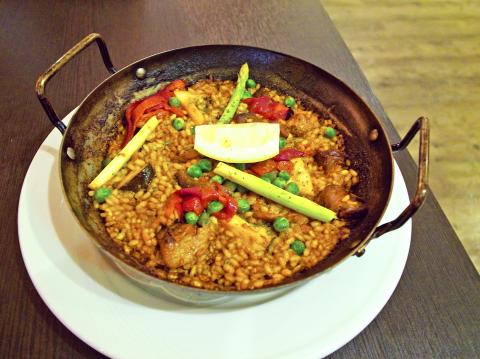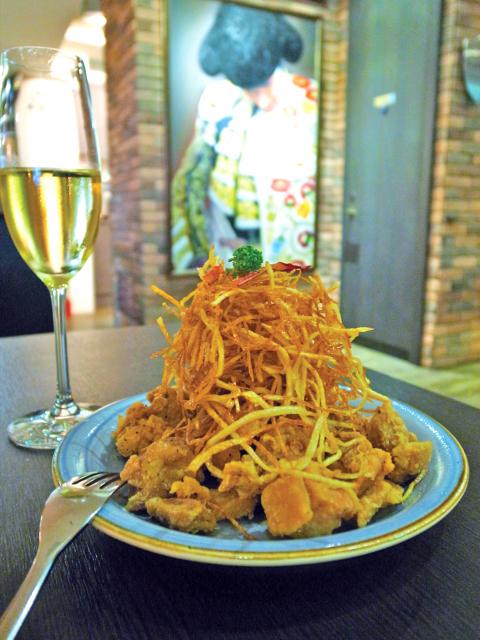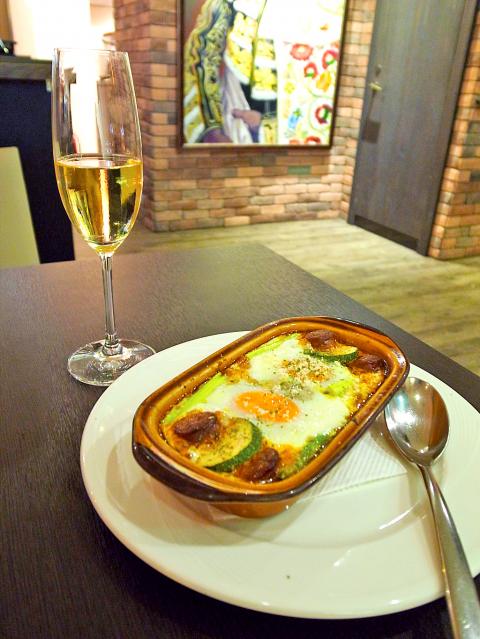Located off Taipei’s posh Dunhua South Road, MVSA Spanish Restaurant & Bar features a pleasant dining space, a solid selection of Spanish tapas and an extensive wine list as well as a culinary endorsement in its collaboration with Hong Kong-based Inno Hospitality Company (香港宜諾管理顧問公司) and Taninia, a Spanish wine group.
The restaurant draws its gastronomic inspiration from the 60-year-old Sarria Bodega, one of Taninia’s five wineries located in the historic city of Pamplona in northern Spain. With training provided by Sarria’s executive chef, Jorge Garcia, whose decades-long career includes stints at several Michelin-starred establishments, MVSA certainly has the credentials. A recent weekend visit, however, reveals that it has yet to reach a refined level of cuisine.
Fortunately for wine lovers, what the establishment lacks in food offerings, it makes up for in the large, wallet-friendly collection of Spanish red, white and sparkling wine. The non-connoisseur, however, may find it slightly frustrating to get knowledgeable suggestions from the young wait staff, who don’t seem well-versed in the finer lineaments of the grape.

Photo: Ho Yi, Taipei Times
That being said, diners should encounter no difficulty getting satisfying tidbits to their liking from the more than two-dozen offerings. The anchovy in white wine vinegar on sliced bread (NT$150) is a popular cold tapas that balances the piquant tang of the fish with the richness of olive oil and vinegar.
For a mellower taste, the baked sausages and eggs with vegetables (NT$380) feature asparagus and zucchini that come topped with a semi-raw egg, which delivered a hearty layer of smoothness when the raw yolk was stirred evenly into the dish.
The fried chicken marinated with garlic and brandy (NT$220) makes a good pairing with a robust red, its slices of deep-fried potatoes and the crunchy bites of meat saturated with the aroma of garlic.

Photo: Ho Yi, Taipei Times
Other hot tapas recommended by our wait staff include stewed chicken Catalonia style (NT$220), grilled vegetables Spanish style (NT$240) and sliced onion and potato omelet (NT$180).
Apart from tapas, MVSA’s kitchen produces several varieties of paella, main courses, salad and soup as well as a couple of traditional dishes. Baked salt-crusted sea bass with herbs (NT$480) and whole roasted baby pig (NT$6,000) must be ordered at least two days ahead.
My dining partner and I were both pleasantly surprised by the Valencian-style paella (NT$420 and NT$780), a flavorful combo of asparagus, mushroom, beans, bell peppers, pork and chicken sprinkled with fresh lemon juice. The rice was cooked perfectly, tender and al dente.

Photo: Ho Yi, Taipei Times
While the atmospherically lit and tastefully decorated restaurant can be an ideal spot to enjoy a few glasses of wine with friends, gulping down alcoholic nectar is not the only way to end a meal at MVSA. The restaurant also offers desserts such as French toast with vanilla ice cream (NT$180) and chocolate chips with fruity mousse (NT$200).
MVSA Spanish Restaurant & Bar is part of the Spanish Tapas Tour 2014, an event launched by the Spanish Chamber of Commerce in Taiwan, aiming to promote the gastronomic culture of Spain through a culinary tour held by several Spanish restaurants in Taipei, Greater Taichung and Greater Kaohsiung.
A Tapas Tour passport, which contains all promotional information, is available at participating restaurants and event sponsors. Having their passports stamped by the restaurants, diners can participate in a lucky draw to win a round-trip ticket to the southwestern European country, and other gifts.
More information about the promotional event, which runs through Aug. 31, can be found on its Facebook fan page titled Foods & Wines from Spain (Taiwan).

One of the biggest sore spots in Taiwan’s historical friendship with the US came in 1979 when US president Jimmy Carter broke off formal diplomatic relations with Taiwan’s Republic of China (ROC) government so that the US could establish relations with the People’s Republic of China (PRC). Taiwan’s derecognition came purely at China’s insistence, and the US took the deal. Retired American diplomat John Tkacik, who for almost decade surrounding that schism, from 1974 to 1982, worked in embassies in Taipei and Beijing and at the Taiwan Desk in Washington DC, recently argued in the Taipei Times that “President Carter’s derecognition

This year will go down in the history books. Taiwan faces enormous turmoil and uncertainty in the coming months. Which political parties are in a good position to handle big changes? All of the main parties are beset with challenges. Taking stock, this column examined the Taiwan People’s Party (TPP) (“Huang Kuo-chang’s choking the life out of the TPP,” May 28, page 12), the Democratic Progressive Party (DPP) (“Challenges amid choppy waters for the DPP,” June 14, page 12) and the Chinese Nationalist Party (KMT) (“KMT struggles to seize opportunities as ‘interesting times’ loom,” June 20, page 11). Times like these can

JUNE 30 to JULY 6 After being routed by the Japanese in the bloody battle of Baguashan (八卦山), Hsu Hsiang (徐驤) and a handful of surviving Hakka fighters sped toward Tainan. There, he would meet with Liu Yung-fu (劉永福), leader of the Black Flag Army who had assumed control of the resisting Republic of Formosa after its president and vice-president fled to China. Hsu, who had been fighting non-stop for over two months from Taoyuan to Changhua, was reportedly injured and exhausted. As the story goes, Liu advised that Hsu take shelter in China to recover and regroup, but Hsu steadfastly

You can tell a lot about a generation from the contents of their cool box: nowadays the barbecue ice bucket is likely to be filled with hard seltzers, non-alcoholic beers and fluorescent BuzzBallz — a particular favorite among Gen Z. Two decades ago, it was WKD, Bacardi Breezers and the odd Smirnoff Ice bobbing in a puddle of melted ice. And while nostalgia may have brought back some alcopops, the new wave of ready-to-drink (RTD) options look and taste noticeably different. It is not just the drinks that have changed, but drinking habits too, driven in part by more health-conscious consumers and